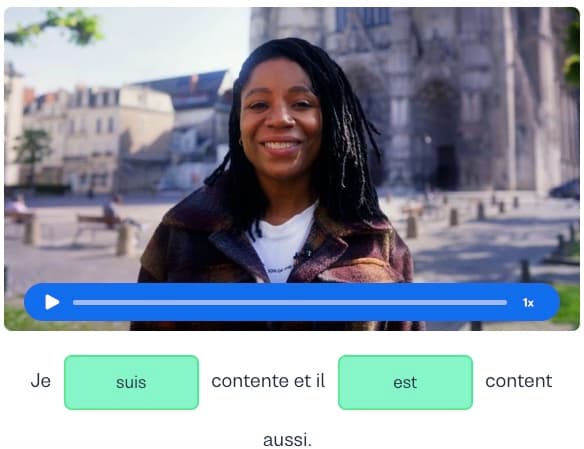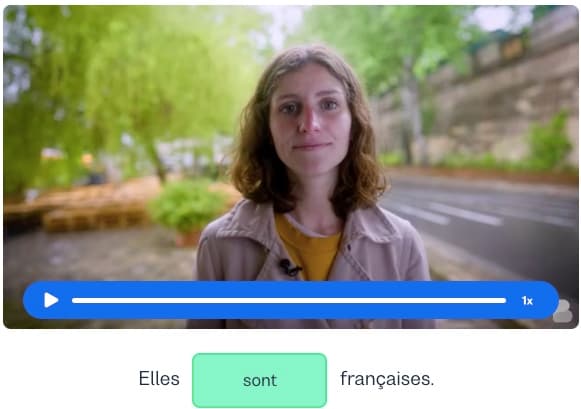I want to learn...
The verb " être " is one of the most fundamental and frequently used verbs in French. It translates to "to be" in English and plays a critical role in expressing states of being, identity, characteristics, and descriptions. Mastering the conjugation of "être" is an important building block for strong grammar skills in French.
As a linking verb, "être" connects the subject of a sentence to its complement. This is usually an adjective, a noun, or a prepositional phrase. It helps describe characteristics, nationality, professions, and relationships. If you want to express your nationality, talk about someone's profession, or describe how you feel, the verb "être" plays a central role in constructing those sentences.
Conjugation of "être" in the present tense
To fully understand and utilize the verb "être" in French, it's important to memorize its conjugation in the present tense.
Here are all the forms of "être" in the present tense:
Present tense of “être”
| French Pronoun | Conjugation | Example |
|---|---|---|
| Je | suis | Je suis étudiant. (I am a student.) |
| Tu | es | Tu es intelligent. (You are intelligent.) |
| Il / Elle/ On | est | Il est français. (He is French.) Elle est médecin. (She is a doctor.) |
| Nous | sommes | Nous sommes heureux. (We are happy.) |
| Vous | êtes | Vous êtes en retard. (You are late.) |
| Ils / Elles | sont | Ils sont sportifs. (They are sporty.) Elles sont artistes. (They are artists.) |
The conjugation of "être" in the present tense allows you to express various states of being, to describe people or things, and to explain relationships and characteristics.
Introduction to the verb "avoir"
The verb "avoir" in French translates to "to have" in English. It is another essential verb needed to convey possession, expressions of age, feelings, and more. Understanding how to conjugate "avoir" is vital for expressing ownership, describing situations, and discussing personal experiences.
As an irregular verb, "avoir" has its own unique conjugation that requires memorizing. If you want to talk about what you have, express your age, or discuss past experiences, then the verb "avoir" is indispensable in constructing those sentences.
Conjugation of "avoir" in the present tense
To effectively use the verb "avoir" in French, you must learn its conjugation in the present tense. Here are all the forms of "avoir" in the present tense:
Present tense of “avoir”
| French Pronoun | Conjugation | Example |
|---|---|---|
| J’ | ai | J'ai une voiture. (I have a car.) |
| Tu | as | Tu as faim. (You are hungry.) |
| Il / Elle/ On | a | Il a beaucoup d'amis. (He has many friends.) Elle a trente ans. (She is thirty years old.) |
| Nous | avons | Nous avons une réunion demain. (We have a meeting tomorrow.) |
| Vous | avez | Vous avez de la chance. (You are lucky.) |
| Ils/Elles | ont | Ils ont un chien. (They have a dog.) Elles ont des fleurs. (They have flowers.) |
The conjugation of "avoir" in the present tense enables you to express possession, to describe personal states, and to discuss various aspects of life.
Past tense forms of the verbs "être" and "avoir"
In addition to the present tense, it is important to familiarize yourself with the past tense forms of the verbs "être" and "avoir." These verbs are commonly used to express what someone was or had in the past. They provide valuable information about experiences and situations that have occurred.
Conjugation of "être" in the past tense
The passé composé of "être" is formed using the verb "être" conjugated in the present tense in combination with the past participle of the main verb.
Here are the conjugated forms of "être" in the past tense:
Past tense of “être”
| French Pronoun | Conjugation | Example |
|---|---|---|
| J'ai été | (I was/I have been) | J'ai été à Paris l'année dernière. (I was in Paris last year.) |
| Tu as été | (You were/You have been) | Tu as été malade pendant une semaine. (You were sick for a week.) |
| Il / Elle / On a été | (He/She was/He/She has been) | Il a été très occupé ces derniers jours. (He was very busy these past few days.) |
| Nous avons été | (We were/We have been) | Nous avons été heureux de te voir. (We were happy to see you.) |
| Vous avez été | (You were/You have been) | Vous avez été formidables lors de la réunion. (You were great during the meeting.) |
| Ils / Elles ont été | (They were/They have been) | Ils ont été surpris par la nouvelle. (They were surprised by the news.) |
Conjugation of "avoir" in the past tense
The past tense of "avoir" is formed using the verb "avoir" with the past participle of the main verb. Here are the conjugated forms of "avoir" in the past tense:
Past tense of “avoir”
| French Pronoun | Conjugation | Example |
|---|---|---|
| J'ai eu | (I had/I have had) | J'ai eu une idée brillante. (I had a brilliant idea.) |
| Tu as eu | (You had/You have had) | Tu as eu beaucoup de chance. (You were lucky.) |
| Il / Elle / On a eu | (He/She had/He/She has had) | Il a eu du succès dans sa carrière. (He had success in his career.) |
| Nous avons eu | (We had/We have had) | Nous avons eu un bon repas au restaurant. (We had a good meal at the restaurant.) |
| Vous avez eu | (You had/You have had) | Vous avez eu une belle opportunité. (You had a great opportunity.) |
| Ils / Elles ont eu | (They had/They have had) | Ils ont eu des difficultés à résoudre le problème. (They had difficulties solving the problem.) |
Let’s recap
Mastering the conjugation of the verbs "être" and "avoir" is crucial for effective communication and building a strong foundation in French. These verbs play a major role in expressing actions, possession, and experiences, both in the present and the past. By understanding their conjugations, you gain the ability to construct accurate sentences and convey precise meanings.
In the present tense, "être" allows you to express characteristics, identity, and states of being, while "avoir" is indispensable for indicating possession and relationships. By practicing the conjugated forms of these verbs in the present tense, you can accurately express yourself and engage in meaningful conversations.
When discussing the past, the past tense forms of "être" and "avoir" become essential. They enable you to describe past actions, events, and experiences. By mastering the conjugation of these verbs in the past tense, you can effectively communicate about what was and what was possessed, adding depth to your conversations.
By embracing the learning journey and practicing the conjugation of "être" and "avoir," you develop confidence in expressing yourself accurately in French. These verbs provide you with the tools to discuss a wide range of topics, from personal characteristics to past experiences, possession, and more. Remember to practice regularly, and embrace the versatility and power of these verbs.
Newlanguages


